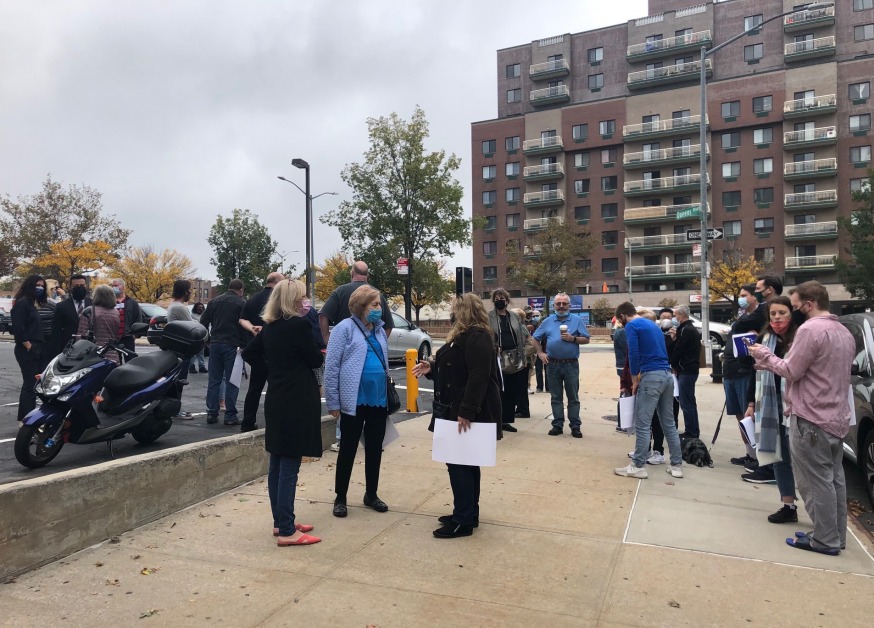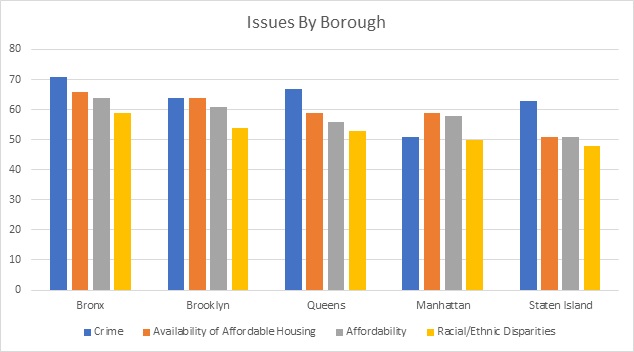
Queens voters at a recent campaign rally in Woodside. (Photo: Queens Post)
May 19, 2021 By Ryan Songalia
Queens voters aged 50+ view crime as their number one concern, a recent poll found.
An AARP-Siena College poll published Monday found that 67 percent of Queens respondents 50+ named crime as their biggest concern, followed by the availability of affordable housing at 59 percent.
The concern relating to public safety comes at a time when violent crime has jumped significantly across the city, although overall crime has dipped.
The number of murders across the 5 boroughs for the year through May 9 is up 27 percent compared to the same time frame in 2020, from 115 to 146. There has also been an 86 percent increase in shooting incidents and a 69 percent increase in hate crimes compared to the same period last year.

An AARP-Siena poll of active NYC voters 50+ found that respondents from Queens viewed crime as their biggest concern
Overall crime, however, is down 6 percent compared to the same period last year, primarily due to a reduction in non violent crimes.
Poll respondents were asked what they deemed to be “very serious” concerns. While 67 percent of Queens respondents said crime and 59 percent affordability, other serious concerns came to the fore.
Queens respondents 50+ viewed the following as very serious concerns: affordability of living (56 percent); discrimination (53 percent); pedestrian safety (39 percent), ageism (31 percent), safety net social issues (30 percent), suitable transportation (23 percent) and high-speed internet (22 percent) rounding out the poll.
The results tracked with the responses given by voters of the same age group across the city. Across the five boroughs the “serious concerns” were crime (63 percent) coming in first, followed by affordable housing (61 percent), affordability (59 percent) and racial discrimination (53 percent).
In terms of the upcoming mayoral election, poll respondents were asked to weigh in on who they would vote for.
Among Queens voters, Andrew Yang was their first choice at 25 percent. Meanwhile, 15 percent of respondents said that Brooklyn Borough President Eric Adams was their first choice and 11 percent said City Comptroller Scott Stringer was their top pick. The biggest block of voters were undecided at 27 percent.

An AARP-Siena poll of active NYC voters 50+ found that respondents from across NYC viewed crime as their biggest concern
Older voters are expected to play a pivotal role in the primary elections.
“New Yorkers 50+ are the city’s most reliable voters, accounting for three out of four ballots cast in the last open mayoral primary when only 20 percent of registered voters turned out,” said Beth Finkel, State Director of AARP New York.
The poll surveyed 811 active voters in New York, including 208 Queens voters, between March 29 and April 8.
Among those polled, 531 were Democrats and 129 were Republicans, with the rest being independents or other party affiliation. The margin of error was +/- 3.8 percent.

An AARP-Siena poll of active NYC voters 50+ found that respondents from across NYC viewed crime as their biggest concern
